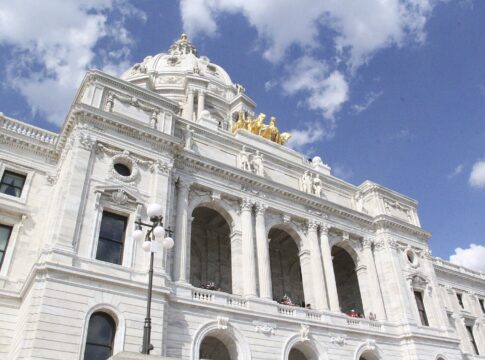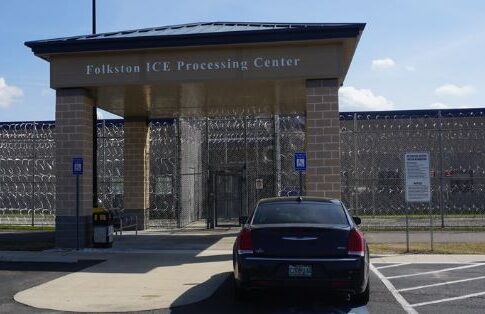By Jia H. Jung, California Local News Fellow
Members of Bay Climate Action, an ad-hoc committee composed of over 50 local Bay Area and national environmental organizations, strode up to San Francisco’s Moscone Center last Thursday with a special delivery.
The activists moved toward the entrance, lugging a cardboard box, heavy with printouts of more than 15,000 names of people who had already signed the group’s petition to insert more language about environmental standards in America’s trade deals. After being turned away by security guards, the rally participants took to the curb but continued chanting in the presence of cameras from local television outlets.
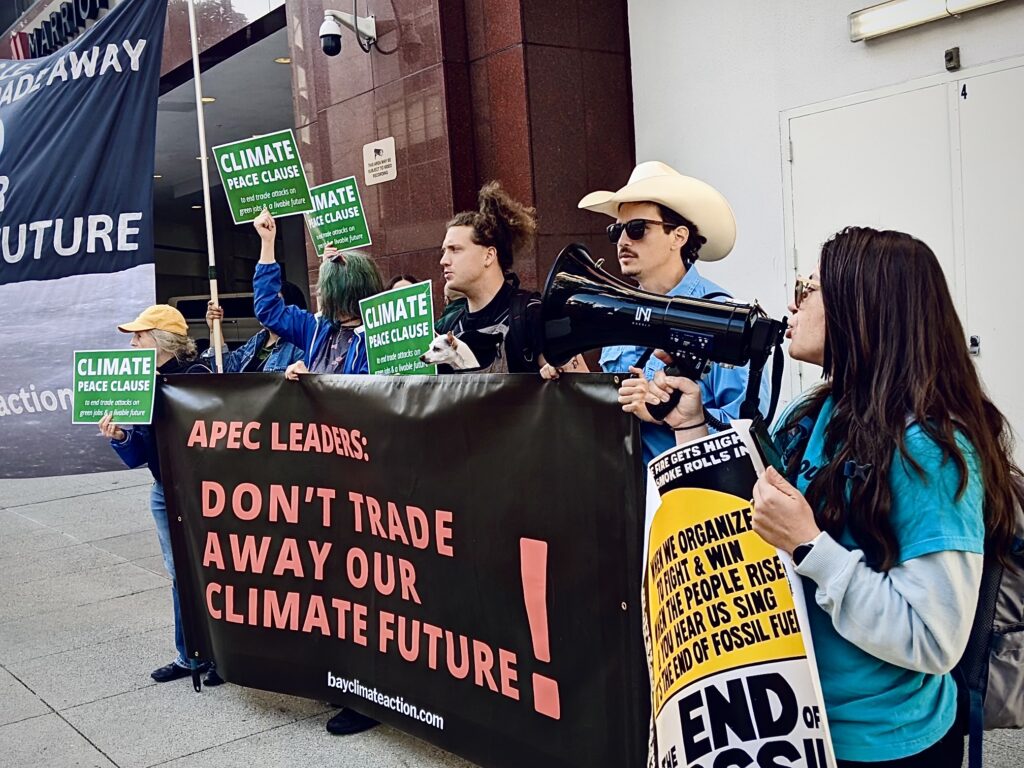
Convening behind the closed doors of the glassy convention center were trade leaders of the U.S., the ASEAN member states of Brunei Darussalam, Indonesia, Malaysia, the Philippines, Singapore, Thailand, and Vietnam, plus Australia, Fiji, India, Japan, South Korea, and New Zealand.
The officials were in their seventh round of discussions about the Indo-Pacific Economic Framework (IPEF) for Prosperity launched in May 2022.
LATEST STORIES
Days ago, the concerns of five U.S. Senators and seven members of the House of Representatives in areas of security, privacy, and competition had removed digital trade topics from the schedule of IPEF negotiations. Trade officials hoped to make determinations about other aspects of the framework and announce them during the Asia-Pacific Economic Cooperation (APEC) Economic Leaders’ Week from Nov. 11-17.
“We wanted to send a message that the people are ready for bold climate action,” said Pakistani American Will Wiltschko to AsAmNews, as the remaining core crew packed up their signs, bullhorns, and banners. He added, “I think we did. They never expect people to show up at these things.”
Wiltschko began organizing Bay Climate Action just two months ago, propelled by his experience as director of the California Trade Justice Coalition (CTCJ).
CTJC’s tagline of “building a strong, just, sustainable economy for all” runs right up against this year’s APEC theme: “Creating a Resilient and Sustainable Future for All.”
Heads of state attending APEC include President Joe Biden and leaders from 20 other countries of the Pacific Rim, constituting the largest gathering of world leaders in San Francisco since the signing of the U.N. charter on Jun. 25, 1945, at the Veterans War Memorial Building on Van Ness.
A growing number of people in San Francisco, across the U.S., and around the world have witnessed and felt firsthand the effects of APEC dealings on the environment and on human beings. They have little reason to expect that APEC leaders or IPEF architects preoccupied with geopolitical dynamics (power) and advancement of their respective economic interests (money) will be able to live up to a slogan suggesting environmental justice or sustainability for those with neither money nor power.
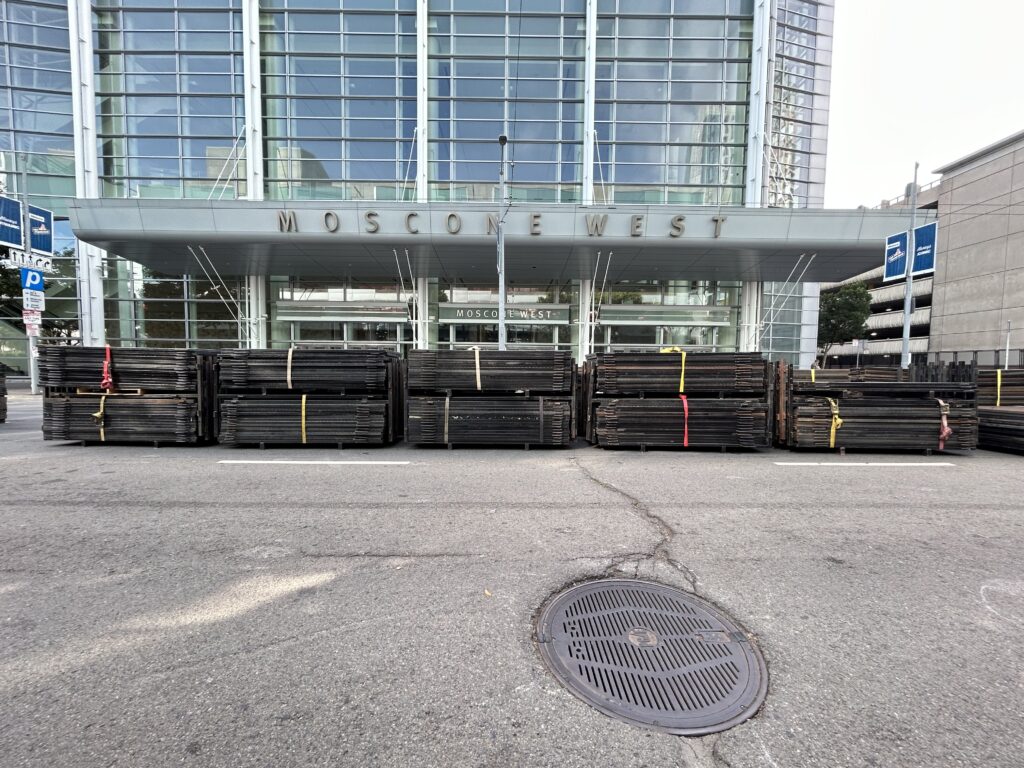
Bay Climate Action’s rally was the first of many protest-type actions coolly expected by IPEF and APEC officials who will fill the city for the next week. Substantial global concerns underlie these protests, and many feel that APEC routinely fails to address them, at the peril of the interconnected Pacific Rim countries and the people who live there.
Over half (15) of the APEC nations are Asian or Pacific Islander (API) or have notable Indigenous API populations: Brunei Darussalam, China, Hong Kong, Indonesia, Japan, Malaysia, New Zealand, Papua New Guinea, Philippines, Singapore, South Korea, Taiwan, Thailand, and Vietnam.
The U.S. is home to diasporas originating from these countries, all of which are growing fast because of mass migration provoked by poverty, political conflict, and unsurvivable living conditions due to climate change and environmental degradation.
Streetside, Wiltschko told AsAmNews that he meets people impacted by trade deals like IPEF “all the time” in his line of work. Later, he wrote, “As someone in the South Asian community, I’ve seen the negative impact policies made by elites behind closed doors hurt people in the Global South and here in California. Communities of color everywhere suffer, and it’s important for Americans to speak out.”
“Global South” is a phrase first used by left-wing political activist Carl Oglesby in a 1969 article in the liberal Catholic publication Commonweal when he wrote that the Vietnam War was a product of northern “dominance over the global south.” The terminology refers to undeveloped, underdeveloped, and less developed parts of Africa, Latin America, Oceania, and Asia within which many but not all of the IPEF and APEC member states are located.
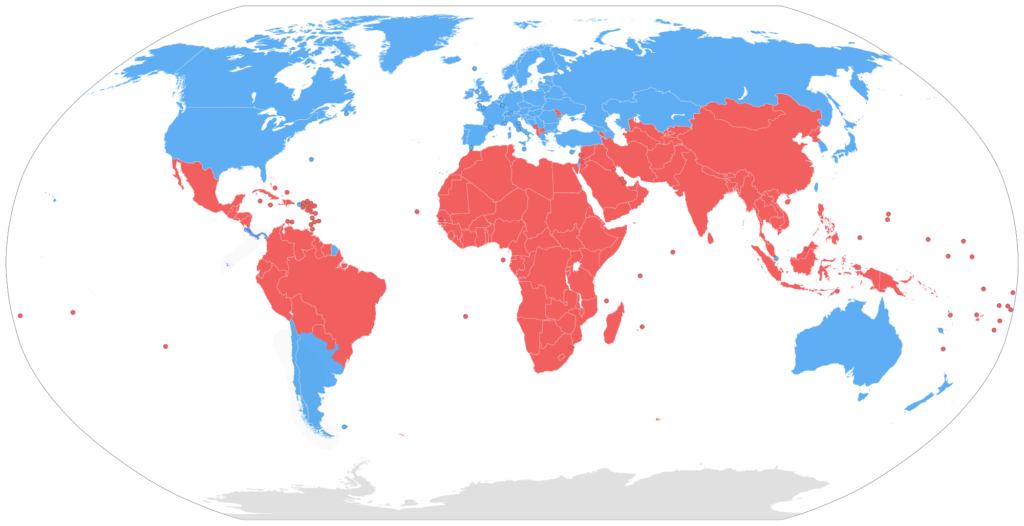
The persisting disadvantage of the Global South in trade dialogues has given rise to organized activism in the U.S. So far, Bay Climate Action has amassed numerous endorsers, several of which are focused on Asian and Pacific Islander communities linked with the Global South, such as Asian Pacific Environmental Network, Alliance of South Asians Taking Action, Brown & Green, Students of Color Environmental Collective.
IPEF is the Biden administration’s plan to advance U.S. interests across the Asia-Pacific. From IPEF’s vantage point, the highest priorities are to diversify America’s economic ties in the region and present the U.S. as an alternative to China for other countries in the region that want to deepen alignment with a powerful trading partner.
The Four “Pillars” of the trade agreement
Unlike traditional trade agreements, IPEF does not seek to lower tariffs or improve market access among participating economies. Instead, the agreement professes to put special emphasis on environmental, labor, and humanitarian standards. The framework has four “pillars” toward this end.

The first pillar is fair and resilient trade. Bay Climate Action and other like-minded activists feel that the U.S. strengthens its position in trade unfairly by grabbing land in other countries, dominating production with multinational corporations, and conscripting people from other countries to work under inequitable conditions for little pay.
The second pillar is supply chain resilience, brought to the fore when the pandemic caused delays, scarcity, and expenses that exposed the extent of America’s reliance on materials, services, and systems based throughout the Asia-Pacific and elsewhere. This pillar is the only one that has been officially published and does not mention the factor of climate change.
The third pillar is the notion of supporting and maintaining clean economies among the IPEF member nations and beyond. The U.S. projects a commitment to clean energy, decarbonization, and infrastructure; activists believe that these initiatives in fact involve exploitative, extractive policies that cause pollution, displacement of Indigenous people from their land, destruction of animals and whole ecosystems, and the increase of greenhouse gasses across the board.
The fourth and final pillar is that of a fair economy. The U.S. states that this means “preventing and combating corruption and related financial crimes, improving tax administration, and increasing cooperation, information sharing, and capacity building on these issues.”
Bay Climate Action says the framework leaves out key objectives
Activists feel like a good place to show this intention in practice would be through more transparency in key dealings like the IPEF discussions. If activists cannot have a seat at the table, they want specific assurance that plans like IPEF will account for the human and environmental impact of large-scale decisions that most people and workers only hear about once they have been made, with no recourse for appeal.
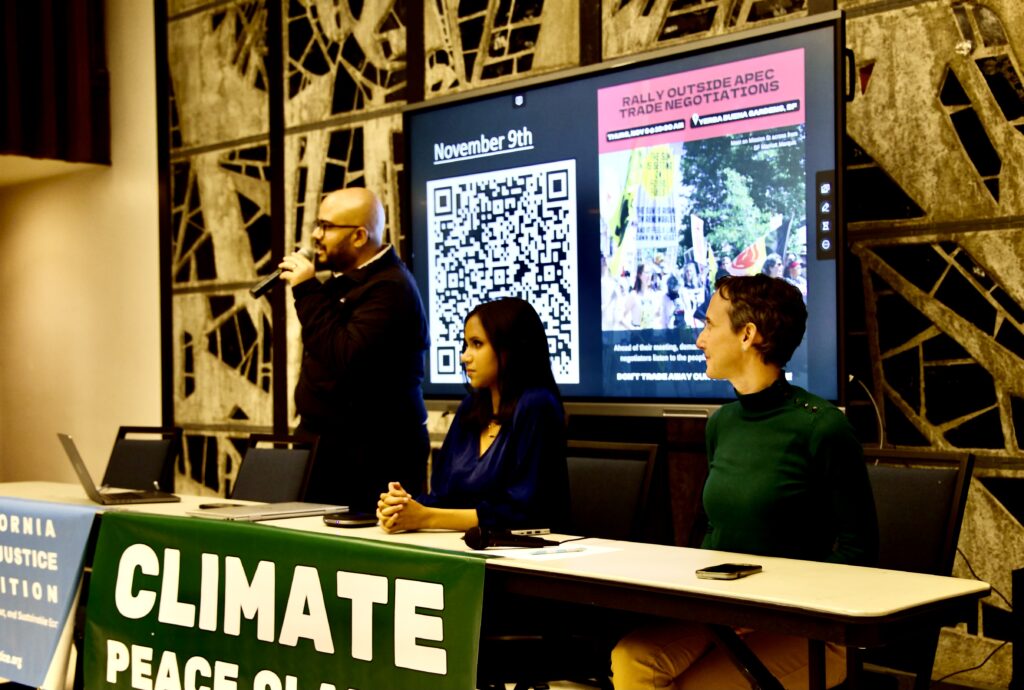
Left out of discussions, Bay Climate Action asks that the framework include three objectives not yet written explicitly into IPEF.
First, end climate pollution: the U.S. has played a disproportionate role in bringing about the climate crisis and should stop subsidizing fossil fuels and get greenhouse gas emissions to zero while helping other countries do the same.
Second, globalize climate justice instead of reserving it for wealthy, developed nations and white people in power. Activists want the U.S., all 13 other IPEF countries, and all 20 of the other APEC nations to ensure climate justice for “all’ by taking real action to level out the unequal impact that development and climate change have already proven to have upon the global poor and people of color around the world.
Last but not least, stop trade attacks on climate action. According to Wiltschko, countries can and do take one another to court if they feel that processes or efforts to protect the environment and workers hinder business development and money-making.
The Bay Climate Action committee asks that a Climate Peace Clause preventing anti-environmental red tape and litigation be adopted not only by IPEF but the U.S.-EU Trade and Technology Council (TTC), the Group of Seven (G7) political forum consisting of the U.S., Canada, France, Germany, Italy, Japan, and the United Kingdom, and any other U.S. trade negotiations.
Bay Climate Action’s petition promoting the clause is now backed by the Trade Justice Education Fund of Washington, D.C. and Public Citizen’s Global Trade Watch.
Signatories of the clause would agree to stop challenging each others’ clean energy and climate measures and honor the mechanisms of trade and investment pacts to resolve disputes instead.
A form letter to trade negotiators provided on the petition webpage says that the current trade challenges “undermine ambitious climate action and a livable future.”
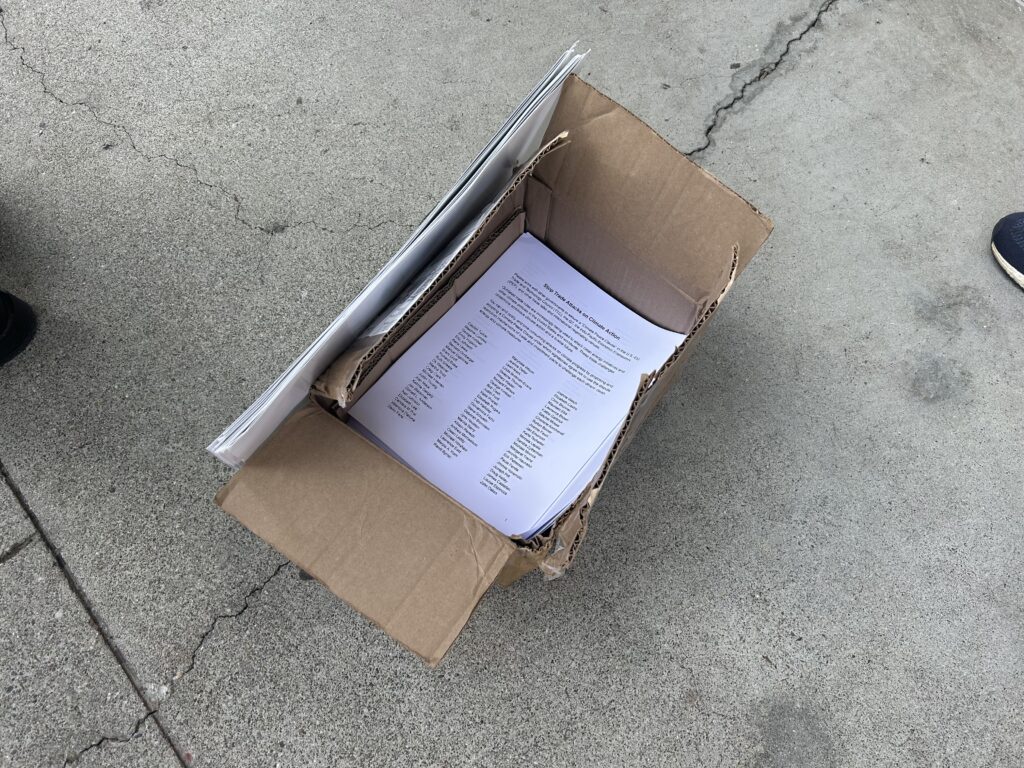
IPEF economies constitute 40% of the global economy and 28% of global trade in goods and services. In downtown San Francisco, this power manifested as an exclusion zone four city blocks wide wrapping around Moscone Center, meant to soften the visible housing crisis that has touched the city.
Local broadcast media coverage has suggested that the walled-off area is for more than security, but to hide and repel unhoused people, drug deals, and shuttering businesses, some of the visible casualties of blunt capitalism in America’s tech epicenter.
Paper signs rendered parking spaces into unconditional tow zones. Cop cars barricaded the streets, diverting local traffic while event workers set up heavy metal panels that created tall walls along both sides of the streets. The normally busy thoroughfares of 4th and Howard streets were eerily empty under the shadows cast by buildings on an otherwise sunny day.
The occasional elder or person of color squeezed through spaces in the makeshift barriers to catch buses that were allowed to pass the blockades. The concrete looked freshly scraped of the humanity and hard realities that blemished them before APEC came to town.
Wiltschko and ralliers disbanded, colorful dots against immaculate gray. Friends and partners who could still, for now, enter the zone pick-ups and drop-offs, arrived to whisk the activists away so they could regroup to join the efforts of a greater No to APEC Coalition.
As part of the coalition’s People’s Counter Summit held at San Francisco State University on Saturday, Wiltschko led the workshops “IPEF and the myths of free trade” and “IPEF and labor.” He emphasized how IPEF neither specifies nor enforces the already minimal worker protections in the U.S. Mexico Canada Agreement (USMCA) and renegotiated the North American Free Trade Agreement (NAFTA).
He and Bay Climate Action will continue voicing their demands over the course of APEC Economic Leaders’ Week. Their movement is still collecting signatures.

AsAmNews is published by the non-profit, Asian American Media Inc. Follow us on Facebook, X, Instagram, TikTok and YouTube. Please consider making a tax-deductible donation to support our efforts to produce diverse content about the AAPI communities. We are supported in part by funding provided by the State of California, administered by the California State Library in partnership with the California Department of Social Services and the California Commission on Asian and Pacific Islander American Affairs as part of the Stop the Hate program. To report a hate incident or hate crime and get support, go to CA vs Hate.




